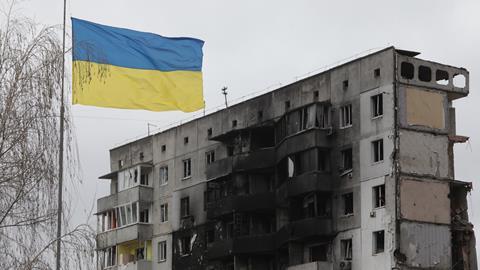The tragic events unfolding in Ukraine are a humanitarian catastrophe. Any objective assessment points to countless lives having been lost, devastation to civilian infrastructure and economic damage that will take decades to undo. We can only hope for a cease fire soon, and an end to the destruction and bloodshed culminating in a durable and lasting peace.

When all is said and done, and the war finally ends, Ukraine will have a strong case for reparations. Yet how are these likely to be advanced, administered or even paid for?
The United Nations was created out of the horrors of World War II, its core objective was and remains today - enshrined in its founding charter - to protect the territorial integrity, sovereignty and political independence of its member states.
While the UN Security Council was empowered to authorise sanctions and the use of force in instances including but not limited to a 'breach of the peace…threat to international peace and security', for almost half a century the Cold War meant the Security Council was rarely capable of achieving consensus between its permanent members - the UK, China, France, USA, and what was the USSR, and now the Russian Federation.
Yet in 1990 when Iraq brazenly violated Kuwait’s territorial integrity it was met with swift and rarely seen unanimous action from the UN Security Council (UNSC), who not only sanctioned Sadam Hussein’s regime, but authorised the use of the force and in doing so, gave the green light to the first Gulf War.
As a direct result of Iraq’s invasion, and galvanised by this rare unanimity, the UNSC passed resolution 687 and thus created a UN compensation commission specifically to deal with Kuwaiti claims arising out of Iraq’s invasion. A precedent was set, for it found that Iraq was liable 'under international law for any direct loss, damage, including environmental damage and the depletion of natural resources, or injury to foreign governments, nationals and corporations, as a result of Iraq’s unlawful invasion and occupation of Kuwait.'
In the context of the invasion of Ukraine and the armed attack by Russia’s military, apart from the palpably unsustainable assertion that Ukraine was engaging in genocide against its own nationals of Russian ethnicity, no credible attempt has been made to provide any legal justification. Accordingly, there is little doubt that Russia has violated a fundamental principle of Public International law, namely Article 2(4) of the UN Charter. Not to mention the potential violations of international humanitarian law (including the Geneva Conventions of 1949 and the Additional Protocol of 1977), currently under investigation.
Given Russia’s veto on the UNSC, no such resolutions are likely to be forthcoming in the Ukraine context to create a compensation commission for obvious reasons.
Nevertheless, a path - outside of the UN - does theoretically exist that could be utilised in the years and decades to come by Ukrainian claimants.
Since Russia’s invasion, the West has imposed extensive sanctions and asset freeze measures on numerous Russian assets. At the time of writing this article, the best estimates suggest that around USD 280 billion in Central Bank of Russia assets have been frozen alone. Not to mention the countless billions in assets from oligarchs and other entities allegedly connected to the Russian state that have also been frozen or seized. As such, a pot exists that Ukrainian claimants could potentially unlock.
It is conceivable that states involved in sanctioning Russia acting unilaterally, or ideally, multilaterally through a treaty arrangement, may agree on a basis for treating such assets as 'Russian state assets'. This would act to formalise part of the potential pool for compensation available against the Russian Federation for the benefit of the Ukrainian claimants and others adversely affected by the conflict.
In addition, there is scope for claims to be brought against the Russian Federation before domestic courts or commercial arbitral tribunals, where jurisdiction exists on a basis such as contract or tort. Whilst the Russian Federation may seek to contest such claims on grounds, inter-alia, of state immunity or non-justiciability the 'jus cogens' fundamental prohibition against a violation of Article 2(4) of the UN Charter is likely to militate against such challenges to jurisdiction being accepted. There is also scope for arbitration claims under the 60+ Investment Treaties protecting foreign Investment in the Russian Federation.
There is little doubt that reparations claims against the Russian Federation will be substantial and that states (as well as potential claimants) are likely to be exploring legal avenues to enable claims to be effectively pursued. The frozen assets are likely to form a major part of such considerations.
Khawar Qureshi QC specialises in commercial and international law and was an “A” Panel UK Government Treasury Counsel before taking silk
































3 Readers' comments